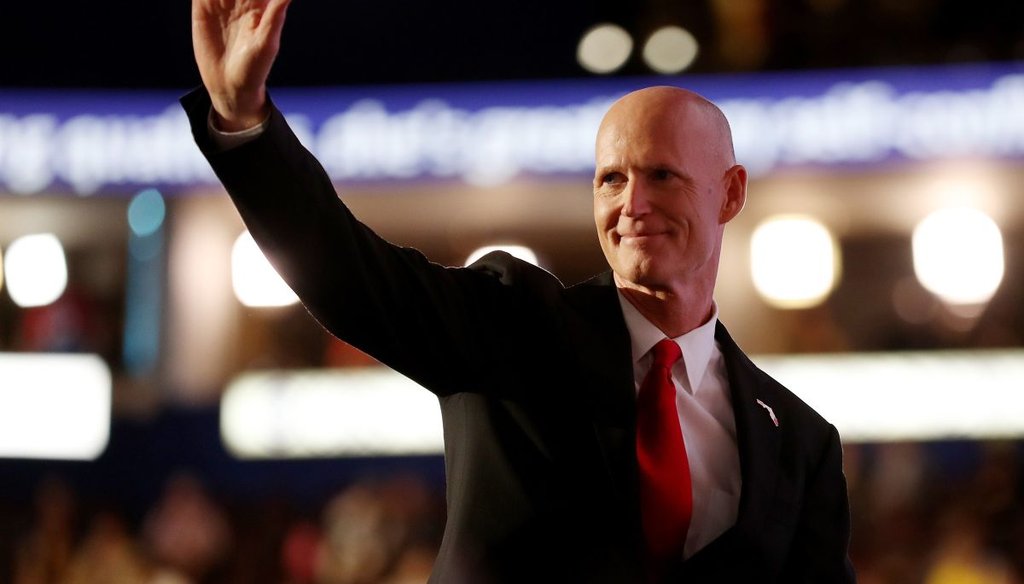Get PolitiFact in your inbox.

Gov. Rick Scott speaks during the Associated Press legislative planning session in Tallahassee on Oct. 14, 2015. (AP photo)
Rick Scott misleads about the inventors of Obamacare by ignoring Republicans' roles
Donald Trump’s White House win gave Florida Gov. Rick Scott a powerful ally in his fight against Obamacare.
In a Nov. 30 op-ed in USA Today, the former hospital executive reiterated his 2010 campaign pledge to fight for repeal of the federal health care law.
"Other than President Obama and a few stragglers, everyone now realizes that Obamacare was a terrible notion," wrote the Republican governor. "It was sold on a lie. It was invented by liberal academic theorists who have no interaction with real families and businesses and therefore it doesn’t work."
Scott’s piece leaves out that the Affordable Care Act of 2010 is based on ideas from not just Democrats but also Republicans.
Behind the trio of academics
Scott’s spokeswoman said he was referring to three academics: MIT economist Jonathan Gruber, Harvard economist David Cutler and Ezekiel Emanuel, who is now chairman of the Department of Medical Ethics and Health Policy at the University of Pennsylvania.
We interviewed all three about their role in the Affordable Care Act or with Obama.
Gruber developed the economic model for the law, which is part of the reason he has received the most attention in the media. He was instrumental in helping Massachusetts create its law, and the federal government contracted with Gruber to provide technical assistance.
The national law was patterned after the Massachusetts law, and they are similar in structure. They both require everyone to have health insurance or pay a penalty; they both leave the current insurance system in place; they both expand coverage for the uninsured through subsidies or Medicaid.
While media reports often refer to Gruber as the "architect" of the bill, some others who worked on the legislation rebutted that characterization. John McDonough, a Harvard health policy professor who was a senior adviser to the Senate Health and Education Committee when the law was written, previously told PolitiFact that Gruber’s involvement with his economic model was important, but he didn’t determine what policies would be in the law.
As for Cutler, he appears to have had the least to do with the law. Scott’s spokeswoman pointed to an October article in Politico referring to him as a "key architect" of Obamacare. But most of the articles we read described Cutler as a health care adviser to Obama during his 2008 campaign and an advocate for the law.
Cutler told PolitiFact that while he spoke with people from the Obama administration, members of Congress and interest groups, "I did not serve in the administration and never wrote a line of the ACA."
Cutler also worked on health care during the Bill Clinton administration and is a senior fellow at the liberal Center for American Progress.
Emanuel was a paid special adviser for health policy to the director of the federal Office of Management and Budget from 2009-11.
Even though Scott called him an academic given his current posting at Penn, Emanuel wasn’t working in academia when he worked for the federal government. (His brother Rahm was President Barack Obama’s former chief of staff.)
Emanuel told PolitiFact that he worked on a lot of the details of the bill including the subsidy levels.
So to recap, two of the men cited by Scott played important roles in the development of the law: Gruber developed the economic model and was an adviser while the law was being written while Emanuel was also a federal government adviser and worked on details of the bill. Cutler didn’t have a direct role in writing the law although he was a health care adviser to Obama during his campaign.
Experts said Scott’s statement exaggerates, omitting the role of many others in the creation of Obamacare -- including conservatives.
"Scott’s comment is so sweeping that it’s hard for it to be anything other than an exaggeration," said Gail Wilensky, who ran Medicare and Medicaid under President George H.W. Bush.
Bipartisan roots
To understand the invention of Obamacare requires looking back at previous attempts to overhaul health care, including by Bill and Hillary Clinton.
Their proposal for universal health care prompted Republicans to come up with their own alternative in 1993. While as a party Republican senators never reached consensus, Republican Sen. John Chafee of Rhode Island introduced a bill with 18 Republican co-sponsors (although some later withdrew) and two Democrats as co-sponsors.
Chafee’s bill had some similarities to Obamacare. It included an individual mandate, created purchasing pools, standardized benefits, and included vouchers for the poor and a ban on denying coverage due to pre-existing conditions.
Another key player was the conservative Heritage Foundation, which advocated for health insurance exchanges including when Massachusetts, led by a Democratic Legislature and Republican Gov. Mitt Romney, crafted its own law in 2006. Many experts we interviewed noted that Romney is not a "liberal academic theorist."
The Massachusetts plan and the national law share the central idea of requiring everyone to purchase health insurance and setting up a marketplace to allow individuals to buy coverage.
Jonathan Oberlander, a health care policy specialist at the University of North Carolina-Chapel Hill, said that liberal academics represented a part -- but not the entirety -- of the creators of the federal law.
"There were many cooks in this kitchen and these ideas were generated over a long period over time," he said. "Ideas such as the individual mandate, exchange and private insurer competition had previously been advocated by conservative health policy analysts and Republican politicians—in many respects the ACA’s design and some of its major policies embodied what used to be core tenets of GOP philosophy on health care."
Our ruling
Scott said Obamacare "was invented by liberal academic theorists."
Scott cherry-picked three advisers supportive of the law with ties to Obama. But he exaggerates by ignoring that many people over several decades from both parties developed the ideas for what would eventually become Obamacare. Most notably, Scott omits Republican Gov. Romney, who enacted a Massachusetts plan four years before the federal law passed, and the conservative Heritage Foundation, which was a strong advocate for the health care exchanges upon which both plans were based.
We rate this claim Mostly False.
https://www.sharethefacts.co/share/7ff1517d-5306-49ce-9a37-71a22c2c3137Our Sources
USA Today, "Repealing Obamacare is only sane path: Gov. Rick Scott," Nov. 30, 2016
CNN, "Obamacare architect discussed misleading public in 4th newly uncovered video," Nov. 13, 2014
Politico, "What politicians are missing about Obamacare," Oct. 17, 2016
Fortune, "Obamacare Architect Zeke Emanuel Has a New Job," Jan. 11, 2016
Harvard University, David Cutler biography, Accessed Dec. 1, 2016
MIT, Bio for Jonathan Gruber, accessed Dec. 1, 2016
Ezekiel Emanuel, Biography, accessed Dec. 2, 2016
Federal Election Commission, Campaign donations, Accessed Dec. 2, 2016
Center for American Progress, "Achieving Accountable and Affordable Care," 2010
Washington Post Fact Checker, "Did Jonathan Gruber earn ‘almost $400,000′ from the Obama administration?" Nov. 14, 2014
PolitiFact, "Rick Scott 'oversaw the largest Medicare fraud' in U.S. history, Florida Democratic Party says," March 3, 2014
PolitiFact, "Is the ACA the GOP health care plan from 1993?" Nov. 15, 2013
PolitiFact, Obama says Heritage Foundation is source of health exchange idea, April 1, 2010
PolitiFact, "Pawlenty says Obamacare is patterned after Romneycare," Aug. 12, 2011
PolitiFact, Facebook post says Republicans embraced individual mandate in 1993, April 19, 2012
PolitiFact Scott-O-Meter, "Will fight to repeal federal health care law," 2010
PolitiFact, "Barack Obama says MIT professor Jonathan Gruber was just 'some adviser,'" Nov. 19, 2014
PolitiFact, "The federal health care law: What came true and what didn’t," March 30, 2015
Interview, Lauren Schenone, Gov. Rick Scott spokeswoman, Dec. 1, 2016
Interview, Jonathan Gruber, MIT economist, Dec. 1, 2016
Interview, David Cutler, Harvard economist, Dec. 1, 2016
Interview, Ezekiel Emanuel, Chair of the Department of Medical Ethics and Health Policy at the University of Pennsylvania, Dec. 2, 2016
Interview, Michael Tanner, senior fellow at the Cato Institute, Dec. 1, 2016
Interview, Robert Blendon, Harvard Professor of Health Policy and Political Analysis, Dec. 1, 2016
Interview, Timothy Jost, Washington and Lee University law professor, Dec. 1, 2016
Interview, Gail Wilensky, economist and senior fellow at Project HOPE, Dec. 1, 2016
Interview, Jonathan Oberlander, professor and chair of Social Medicine and professor of Health Policy & Management at the University of North Carolina-Chapel Hill, Dec. 1, 2016
Browse the Truth-O-Meter
More by Amy Sherman
Rick Scott misleads about the inventors of Obamacare by ignoring Republicans' roles
Support independent fact-checking.
Become a member!
In a world of wild talk and fake news, help us stand up for the facts.






































